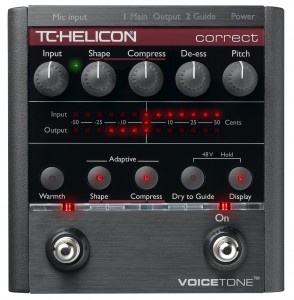Relative Minor
I used to make fun of singers who use pitch correcting autotuners.
Now I make fun of singers who don’t. I’ve been singing backups for a couple of years, and I’ve come to the conclusion that while I have great control of my chest voice, I have very little control of my “head voice”. For you nonsingers, this means I barely have any control at all when I’m trying to sing high without using falsetto. So I bought the TC Helicon “VoiceTone Correct,” pedal.
This is their “old” low-budget pitch corrector, which also includes a very nice sounding compressor and de-esser. It only does chromatic pitch correction, and it best used gently. In  fact, it doesn’t do a great job of “fixing” your pitch at all, and would be better named the “VoiceTone Trainer.” You can’t use it to fix your pitch without sounding quite artifical, but it serves great to provide a training pitch–you can hear instantly whether you succeeded or failed miserably. It’s much faster than watching a stroboscope and leaves your eyes free to stare desperately at the next line of lyrics. This device has done wonders for my ability to sing in tune, especially when singing backup along with singers who are out.
Recently, they came out with a new device, the TC Helicon “VoiceLive Play.” The new device does a lot of other things, but it also does “hard” pitch correction using scales. Unfortunately restricted to either “major” or “minor” but I guess that’s better than just chromatic.
The thing is magic. Unlike the older pedal, it can be used to “fix” your pitches and sounds entirely natural. As one musician told me, “it’s like Avatar.” Â I love everything about it…except that you can’t use the de-esser without also using the compressor. How could they leave that out? Hoping that’s fixed in a firmware update.
There’s certain amount of danger to using  scale-based pitch correction, of course. Two weeks ago, I used my first song-specific setting, a correction for a song in G Major. It worked beautifully.
The next two songs also had backup harmonies… in E Major. It also worked beautifully for those songs, except that I had not reset it to chromatic mode. Guess what happened? E is the relative minor of G, isn’t it? That’s right, all the pitches were dead on, but I couldn’t for the life of me get my voice to make the major third. The monitors were loud enough that I couldn’t hear my voice in my head–I would sing and the wrong note would come out. Other notes were fine, but G# would either come out as G or A. Augh! I’ve lost my ability to sing! What a confidence killer. It doesn’t help that that particular G# is in my somewhat tenuous head voice region.
So it was certainly a relief to find that I had simply un-corrected myself. (Cor-wronged?) I have a feeling this isn’t the last time I’ll do that.
Oh well that’s about it. Anyway, I love this thing.


